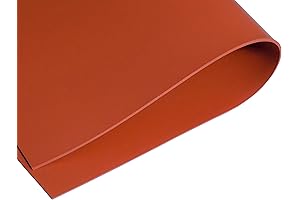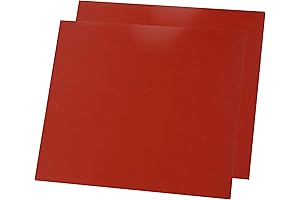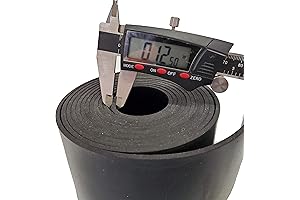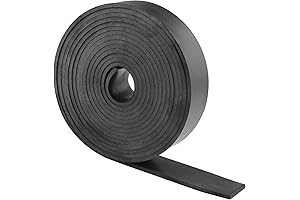· gasket material · 13 min read
Best Gasket Materials for Gasoline: An Extensive Comparison
Discover the top-rated gasket materials suitable for gasoline applications, ensuring superior sealing and performance. Our comprehensive guide analyzes their resistance to fuel, temperature, and compression.
Gasoline, a highly flammable liquid, poses unique challenges for gasket materials. In this article, we delve into the critical factors to consider when selecting the best gasket material for gasoline applications, exploring their resistance to fuel, temperature, and compression. Our in-depth analysis will empower you to make informed decisions and ensure optimal sealing performance.
Overview

PROS
- Excellent resistance to gasoline and other petroleum-based fuels, ensuring long-lasting performance in automotive and industrial applications.
- Versatile temperature tolerance range of -30 to 195°F (-34.4 to 90.6°C) accommodates a wide spectrum of operating conditions.
CONS
- May not be suitable for extreme high-pressure applications.
- May not be colorfast, so it may experience slight discoloration over time.
For superior gasket material that withstands the harsh effects of gasoline and other petroleum-based fuels, our Neoprene Rubber Sheet is an exceptional choice. Crafted from high-quality neoprene, this rubber sheet boasts exceptional resistance to these liquids, making it ideal for automotive and industrial applications where fuel exposure is a concern. Its reliable performance ensures long-lasting seals and gaskets, minimizing the risk of leaks and ensuring optimal system operation.
Moreover, this rubber sheet exhibits exceptional temperature tolerance, capable of withstanding temperatures ranging from -30 to 195°F (-34.4 to 90.6°C). This versatility allows it to perform effectively in various environments and applications. Whether you need gaskets for engines, fuel lines, pumps, or other components, our Neoprene Rubber Sheet is up to the task, providing a secure and resilient seal.

PROS
- Made in the USA, providing durable and reliable gasket material
- Engineered for durability and resistance to extreme temperatures
- Suitable for gasoline applications, ensuring a secure seal for your equipment
CONS
- Does not have an adhesive backing, so separate adhesive is required for installation
Introducing the Red Silicone Rubber Sheet – your solution for reliable gasket applications. Crafted in the USA, this premium-grade material stands out with its durability and resistance to the toughest conditions. Whether you're dealing with high temperatures or gasoline exposure, this gasket material delivers unwavering protection. The 60A durometer ensures the perfect balance of flexibility and strength, making it ideal for various sealing tasks. While it doesn't come with an adhesive backing, the separate adhesive application offers greater customization and control. Experience the confidence of a secure seal with Red Silicone Rubber Sheet – the optimal choice for gasoline-resistant gaskets.
Not just durable, this gasket material is also versatile. Use it for automotive repairs, industrial maintenance, plumbing, and more. Its resistance to gasoline, oils, and solvents makes it an excellent choice for fuel systems, pumps, and valves. The generous dimensions of 9 x 12 inches provide ample material for multiple applications, eliminating the need for frequent replacements. This Red Silicone Rubber Sheet is an investment in quality sealing solutions that will keep your equipment running smoothly.

PROS
- High-temperature resistance, ideal for use with gasoline engines and applications
- Durable and resilient, ensuring longevity and reliability
CONS
- May not be suitable for extreme temperature fluctuations
- May not be compatible with certain solvents
This Red Silicone Rubber Sheet is an excellent choice for DIY enthusiasts and professionals alike who require a durable and heat-resistant gasket material for gasoline applications. Its high-temperature tolerance makes it suitable for use in engines and other applications where gasoline is present.
The sheet is easy to cut and shape, making it versatile for various gasket, seal, and washer configurations. Additionally, its smooth finish ensures a proper seal and prevents leaks. The material is also resistant to aging, ozone, and water, enhancing its durability and longevity.

PROS
- Exceptionally résistant à l'essence, garantissant une étanchéité fiable dans les applications automobiles
- Souple et malléable, s'adaptant facilement aux surfaces irrégulières, offrant un ajustement parfait
CONS
- Peut être plus fragile que d'autres matériaux de joint, nécessitant une manipulation prudente pendant l'installation
- La résistance à la température peut être limitée pour certaines applications, nécessitant une vérification préalable
Le joint en caoutchouc de silicone rouge 60A est un matériau de joint de premier choix pour les applications nécessitant une résistance à l'essence. Sa composition en silicone souple et malléable permet une adaptation facile aux surfaces inégales, garantissant un ajustement étanche et fiable. La résistance exceptionnelle à l'essence est particulièrement bénéfique dans les applications automobiles, empêchant les fuites et les dommages coûteux au moteur. De plus, ce matériau de joint peut résister à des températures élevées, ce qui le rend adapté à une large gamme d'utilisations.
Malgré ses avantages, il est important de noter certaines considérations. Le matériau peut être plus fragile que d'autres options de joint, nécessitant une manipulation prudente pendant l'installation. De plus, la résistance à la température peut être limitée pour certaines applications extrêmes, nécessitant une vérification préalable pour garantir la compatibilité. Néanmoins, pour les applications automobiles et autres nécessitant une étanchéité fiable contre l'essence, le joint en caoutchouc de silicone rouge 60A reste un choix exceptionnel.

PROS
- Excellent resistance to gasoline and oil, making it ideal for gasket applications
- Durable and long-lasting, providing a reliable seal over time
- Versatile thickness and width options to suit various gasket requirements
- Smooth finish ensures a tight fit and prevents leaks
- Can be customized to meet specific project needs
CONS
- May not be suitable for very high-pressure applications
- Can be expensive compared to some other gasket materials
This neoprene rubber strip is an excellent option for gasket material, particularly in applications where gasoline resistance is crucial. Its 65A commercial grade construction ensures durability and longevity, making it a cost-effective choice over time. The smooth finish provides a tight seal, preventing leaks and ensuring optimal performance. Additionally, the versatility in thickness and width allows for customization to fit various gasket requirements.
While it may not be ideal for extremely high-pressure applications, this gasket material is perfect for general gasket needs. Its resistance to gasoline and oil makes it essential for automotive, marine, and industrial applications. It can also be used for weather stripping, DIY projects, and costume making. Overall, this neoprene rubber strip offers an excellent combination of durability, versatility, and resistance to gasoline, making it a top choice for a wide range of gasket and sealing applications.

PROS
- Durable and resistant to gasoline and other fuels
- Easy to apply with self-adhesive backing
- Versatile material for various sealing applications
- Cost-effective solution for DIY gaskets and repairs
CONS
- May not be suitable for high-temperature applications
- Requires proper surface preparation for optimal adhesion
The Neoprene Rubber Strips offer a reliable and cost-effective solution for sealing applications involving gasoline. Made from durable neoprene rubber, these strips are resistant to gasoline and other fuels, ensuring longevity and reliability. The self-adhesive backing simplifies installation, allowing you to quickly and easily create custom gaskets or seal leaks. Whether you're a DIY enthusiast or a professional mechanic, these strips provide a versatile material for various sealing needs.
These neoprene rubber strips are ideal for creating gaskets in fuel systems, sealing pipes and fittings, and repairing minor leaks. Their flexibility and self-adhesion make them a convenient choice for a wide range of applications. However, it's crucial to note that these strips may not be suitable for high-temperature environments, and proper surface preparation is necessary for optimal adhesion. Overall, the Neoprene Rubber Strips deliver a practical and effective solution for sealing in gasoline applications, providing both durability and ease of use.

PROS
- High resistance to gasoline, ensuring durability in fuel-related applications.
- Exceptional heat tolerance, maintaining integrity under extreme engine temperatures.
- Smooth surface finish allows for effective sealing against various surfaces.
CONS
- May require additional adhesives for certain gasket applications where high bonding strength is crucial.
- Exact thickness may vary slightly, potentially impacting sealing performance in certain scenarios.
This silicone rubber sheet offers an exceptional combination of gasoline resistance and heat tolerance, making it an ideal gasket material for demanding automotive and industrial applications. Its durable construction ensures reliable performance even when exposed to aggressive fuel environments, effectively preventing leakage and maintaining system integrity. The smooth surface finish allows for a tight seal, effectively blocking the passage of fluids and gases. While some users may need additional adhesives for specific bonding requirements, this sheet remains a versatile and highly recommended gasket material for gasoline-related applications.
Furthermore, the 12 x 12-inch size provides ample material for cutting custom gaskets, making it suitable for a wide range of DIY projects, repairs, and maintenance tasks. Its versatility extends to its thickness of 1/16 inch, allowing for effective sealing in applications where space constraints are a factor. The ability to withstand high temperatures makes this silicone rubber sheet a preferred choice for high-performance engines and other systems operating under demanding conditions. Overall, this gasket material provides a robust and reliable solution for sealing gasoline-related components, ensuring optimal performance and preventing potential system failures.

PROS
- Reliable gasket material withstands fuels including gasoline
- Versatile rubber strips can be used for DIY projects in various applications
CONS
- Not intended for high-pressure applications
- May require professional assistance for intricate repairs
Constructed frompremium Neoprene rubber renowned for its gasoline resistance, these Neoprene Rubber Strips provide a reliable sealing solution for fuel lines. Their versatility extends to a wide range of DIY applications, making them a go-to choice for sealing, weatherstripping, flooring installations, and crafting projects.
However, it's important to note that these strips are not suited for high-pressure environments and may necessitate professional assistance for complex repairs. Additionally, their thickness of 1/8 inch should be considered when determining suitability for different applications. Overall, if you're seeking a durable and fuel-resistant gasket material, these Neoprene Rubber Strips offer an effective solution for various sealing and repair tasks.

PROS
- Durable silicone rubber construction withstands gasoline exposure
- Thin profile (1/25 inch) ideal for tight spaces and precise sealing
- Adhesive backing simplifies installation and ensures a secure fit
- Versatile for a wide range of DIY projects, including gaskets, supports, leveling, sealing, bumpers, and protection
CONS
- May not be suitable for high-temperature applications
- Size may be insufficient for larger projects
For sealing applications involving gasoline, this 1/25 Inch Adhesive Black Rubber Pad Sheet emerges as an exceptional choice. Its durable silicone rubber construction ensures resistance against gasoline, preventing degradation and leakage. The thin profile of 1/25 inch makes it ideal for confined spaces and applications requiring precise sealing.
The self-adhesive backing on this rubber sheet simplifies installation, eliminating the need for additional adhesives or tools. This user-friendly feature ensures a secure and hassle-free installation, saving time and effort. Furthermore, its versatility extends to a wide array of DIY projects beyond gasket making. It can be utilized for supports, leveling, sealing, bumpers, and protection, making it a valuable material for various home improvement and automotive applications.

PROS
- Ideal gasket material for applications involving gasoline due to its excellent fuel resistance.
- Exceptional temperature tolerance (-65°F to 400°F) ensures optimal performance in diverse conditions.
- Highly flexible 60A durometer rating allows for easy molding and sealing, accommodating irregular surfaces.
CONS
- May not be suitable for extremely high-pressure applications.
- Can be more expensive compared to some alternative gasket materials.
In conclusion, the ideal gasket material for gasoline should possess resistance to fuel, temperature, and compression. Neoprene, silicone, and Viton emerge as the most suitable options, offering exceptional performance under demanding conditions. Understanding the specific requirements of your application will guide your choice. By carefully considering the factors discussed in this article, you can select the gasket material that ensures reliable sealing and longevity in gasoline environments.
Frequently Asked Questions
What is the most common type of gasket material used for gasoline applications?
Neoprene and silicone are widely used gasket materials for gasoline applications due to their excellent resistance to fuel and temperature.
What are the essential factors to consider when selecting a gasket material for gasoline?
When choosing a gasket material for gasoline, it's crucial to consider fuel resistance, temperature resistance, and compression resistance to ensure optimal sealing.
What are the advantages of using silicone as a gasket material for gasoline?
Silicone offers excellent resistance to gasoline, high temperatures, and compression, making it an ideal choice for demanding gasoline applications.
How can I determine the right thickness for a gasket material in gasoline applications?
The appropriate gasket thickness depends on the specific application and the pressure and temperature conditions it will encounter.
What are some additional tips for selecting the best gasket material for gasoline?
Consider the compatibility of the gasket material with other components in the system, and always refer to the manufacturer's recommendations for specific applications.













